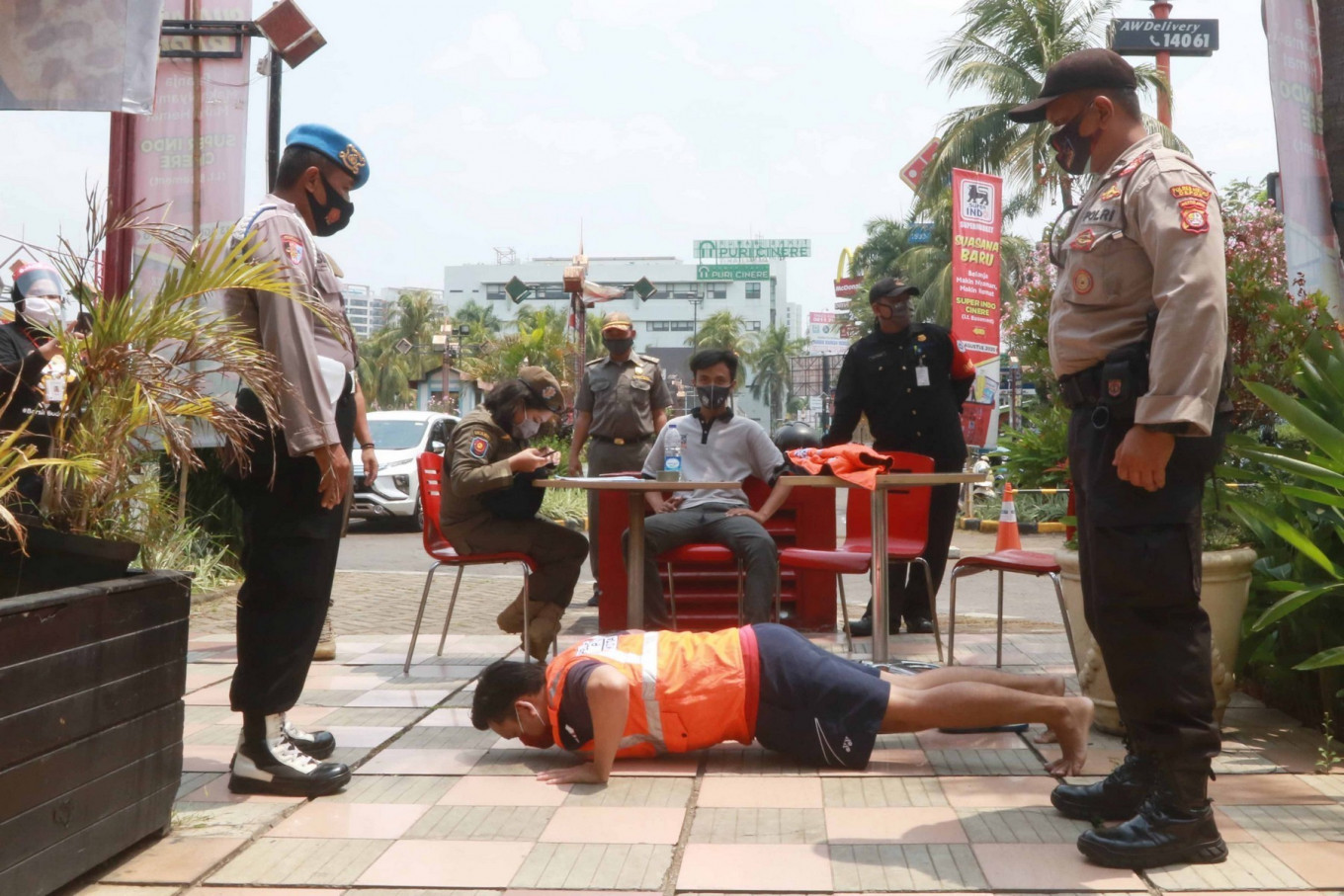Popular Reads
Top Results
Can't find what you're looking for?
View all search resultsPopular Reads
Top Results
Can't find what you're looking for?
View all search resultsResponsibility to protect
As the ghost of the 1998 tragedy still lingers and the police remain reluctant to act against vigilante groups, the reincarnation of Pam Swakarsa may spread fear, not a sense of protection and security.
Change text size
Gift Premium Articles
to Anyone
 A man is forced to do push-ups by joint security task force personnel on Friday as punishment for his failure to wear a mask. The public punishment was part of a police operation designed to enforce COVID-19 health protocols in Cinere, Depok, West Java. Violators of the protocols are subject to fines or non-judicial punishments such as sweeping the roads, singing national songs or doing push-ups. (JP/Dhoni Setiawan)
A man is forced to do push-ups by joint security task force personnel on Friday as punishment for his failure to wear a mask. The public punishment was part of a police operation designed to enforce COVID-19 health protocols in Cinere, Depok, West Java. Violators of the protocols are subject to fines or non-judicial punishments such as sweeping the roads, singing national songs or doing push-ups. (JP/Dhoni Setiawan)
T
he formation of the civilian security guard (Pam Swakarsa) in Indonesia’s tumultuous November 1998 regime change ended in tragedy. The government and the military turned a deaf ear to calls from opposition leaders to dissolve the force, resulting in fatal clashes between Pam Swakarsa and the masses clamoring for democracy.
Members of the guard were recruited from mass organizations known for pro-government leanings and, most of the time, practiced thuggery. They were supported and trained by security authorities and deployed to protect the regime’s interests on their behalf.
Now, after 22 years, the National Police appears to be resurrecting the long-buried force. Through National Police Chief Regulation No.4/2020, signed Aug. 5 but only announced recently, Pam Swakarsa will be called upon again to help the police maintain security and public order.
The police have asked the public not to confuse today’s Pam Swakarsa with the group that operated during the tumult of the fall of Soeharto. Private security guards (Satpam), members of community watches, including traditional guards such as the pecalang in Bali, and mass organizations concerned about security and public order are permitted join the new Pam Swakarsa.
The police’s move comes on the heels of the government’s desperate push for health protocol enforcement to contain COVID -19 transmission. Since the Jakarta administration reinstated large-scale social restrictions (PSBB) last week, the central government has deployed the military and the police to enforce the protocols. The police have launched an operation that intends to ensure public compliance with the rules by fining offenders or imposing other punitive measures.
National Police deputy chief Comr. Gen. Gatot Eddy Pramono said the police could not rely on their own strength to enforce the protocols. Pam Swakarsa, he said, could help them uphold discipline in places such as traditional markets.
In Indonesia, there is one police officer for every 2000 people. In more advanced countries, the ratio can reach 1 to 1,600. Until the National Police close the gap, they will continue to seek the services of civilian groups like Pam Swakarsa.
But the deployment of groups acting as proxies for the police – for whatever reason – invites the abuse of power. Human rights groups fear the groups could be used for purposes that go against the interests of the public, such as silencing voices in protests or advancing political interests. The nation has often witnessed members of mass organizations claiming to be backed by the military or police use force against civilians for financial gain or in the name of religion.
As the ghost of the 1998 tragedy still lingers and the police remain reluctant to act against vigilante groups, the reincarnation of Pam Swakarsa may spread fear, not a sense of protection and security.
The plan to reestablish the force suggests the police’s inability to fulfill their responsibility to protect people and deliver the government’s mandate to uphold public discipline, which is key in the fight against COVID-19. It further underscores the government’s tendency to securitize the pandemic, which harms democracy.









